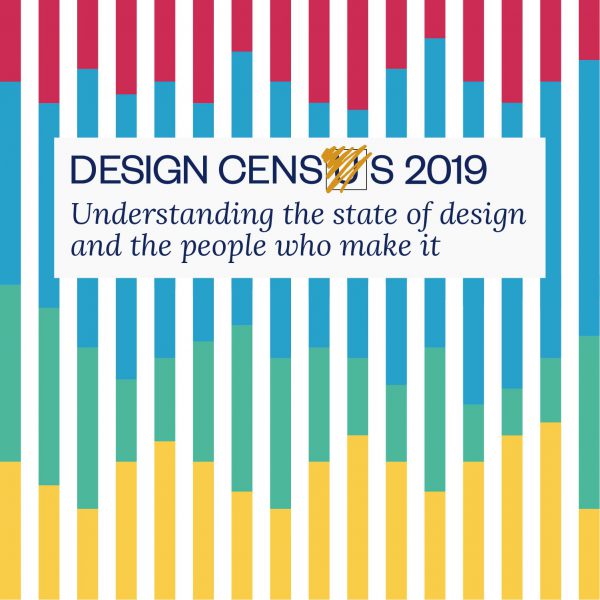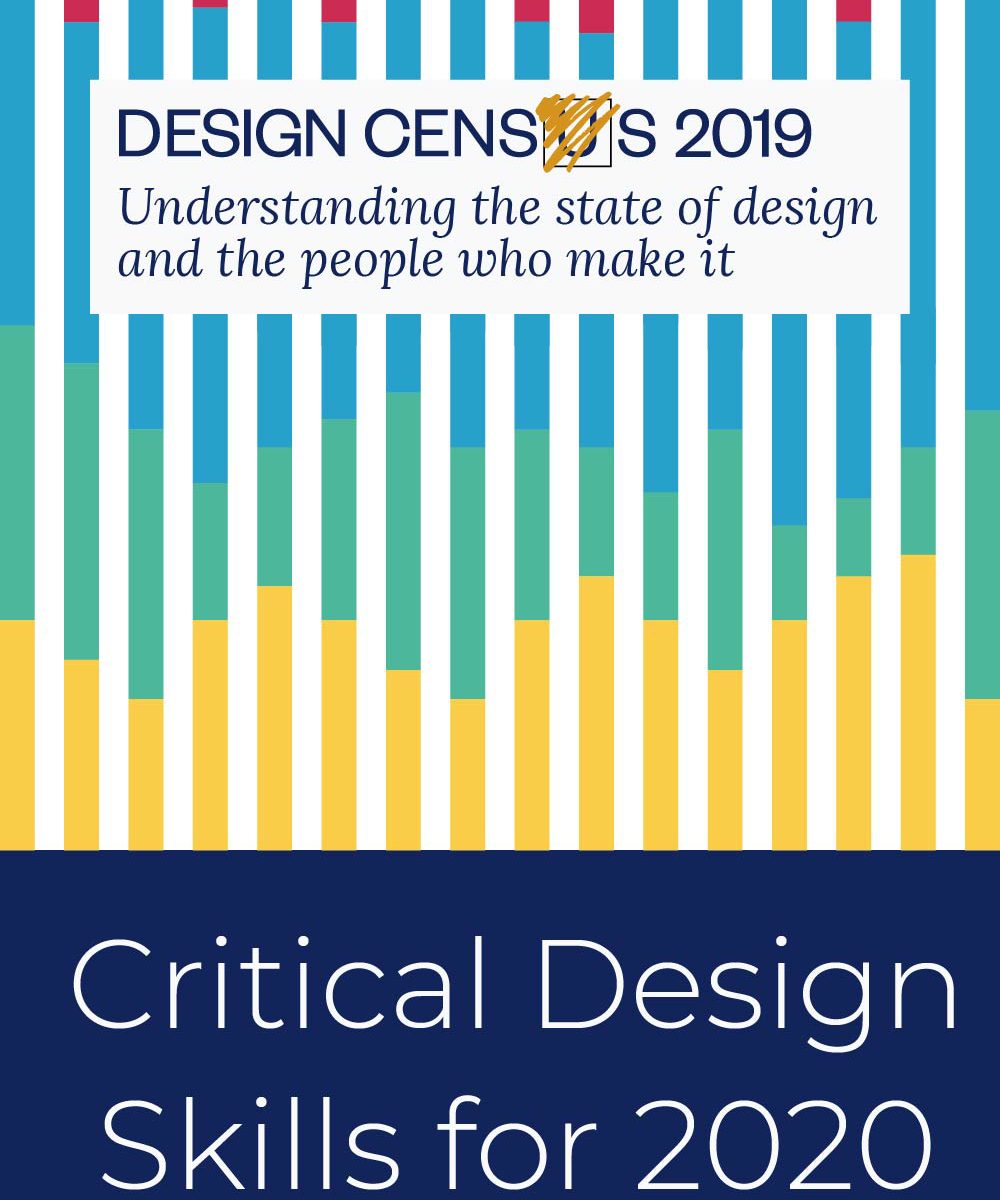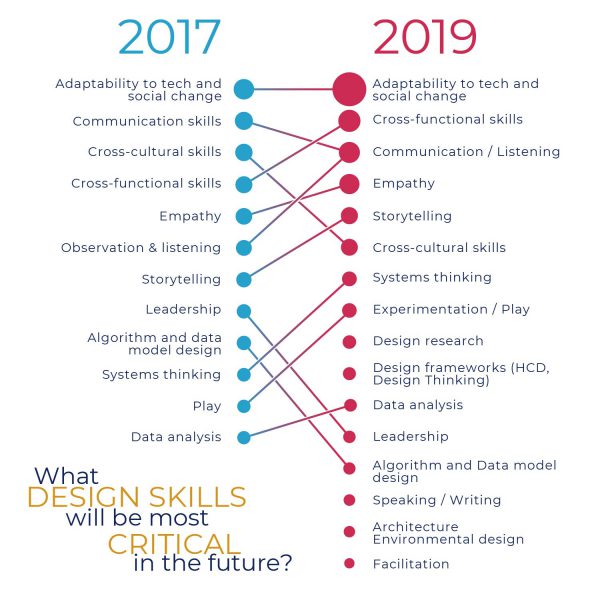
A recent design census from the US provides a fascinating insight into what designers consider are the critical design skills for the future. More than that it provides a survey of how they’re working, what they’re earning, how satisfied they are and what they think about the future.
What always catches my interest is where designers see the industry heading and what design skills they see as most critical to take it there. This is helpful for two obvious reasons, firstly in terms of prioritising your own professional development and secondly as an encouragement when you’ve got those skills already. Either way it is a positive thing and promotes a positive forward looking mind-set.
This is what today’s designers see as the most critical design skills, as they look to the future. How this Compares to 2017 also provides an interesting sense of what’s changing.
Changing design skills
Not a lot has changed in the top spots from 2017. Communication and Listening Skills which were separated out previously have been put together and now take third place. The biggest drop being cross-cultural skills which in some ways surprises me. It may be that other concerns have taken their place. The size of the circles above gives you an idea of the number of respondents in each category. So ‘Adaptability to tech and social change’ stays top but makes a jump in terms of the number prioritising it. We see ‘Cross-functional skills’ move into the number two spot which might make you ask the question I did … ‘What are cross-functional skills?’ and why are they so important for future designers?
Cross-functional skills
Your functional skills are the skills related to your function, i.e. your day to day job. They are the whole gamut of skills that you take to work with you, critical thinking, research, data manipulation, etc. Cross-functional skills on the other hand are the skills that colleagues in other areas of your business take to work with them. So prioritising cross-functional skills is about getting to grips with more than just your own area of speciality. It’s important because cross-functional or multi-disciplinary teams are becoming more and more common.
There’s plenty to recommend this approach, as the variety of viewpoints can be a boost to innovation and problem solving. However, this can also be unproductive and most of that seems to come down to a lack of cross-functional skills. Being able to understand the priorities, systems and workflow of others helps everyone. It enhances your ability to speak a common language that multiplies productivity.
Adaptability is a critical design skill
For designers the adaptability that cross-functional skills demands is part of our DNA. We’re all about solving communication problems with the end user in mind. I’m always reminded of the Mary Poppins line, ‘a spoon full of sugar helps the medicine go down’. Entirely pragmatic and an affront to our waistlines maybe, but finding the method to enable the receiver to get the medicine they need seems like an amusing way to look at design. I’m laughing at myself now. Wondering if marketing communication is really so unpalatable that sweetening the deal is the only way it works? Who doesn’t like to feel like they’re getting a sweet deal – Right?
I digress. The cross-functional skills priority seems an important one for me as a freelance graphic designer. It highlights how important it is to have a range of skills and understanding outside of your specialist area. This also appeals to me as I’ve always been a bit of a magpie as far as skills are concerned. I love learning a new skill or understanding a new topic and these aren’t always related to my day job directly. I’ve been called a ‘Jack-of-all-trades’ before but I’m not all together happy with the traditional adjunct to it ‘master of none’.
Jack-Of-All-Trades
The full saying goes …
“A jack of all trades is a master of none,
Phrases you’ve been misquoting
but often-times better than a master of one.”

The specialist has her place and you will always need them but the versatility and adaptability of the cross-functional ‘jack’ is becoming more critical in our current and future working environment. For start-ups and new businesses of course there isn’t always much of a choice as you need to do it all. Happily that does get better as you get the finances to prioritise what services to invest money in to free up time. There’s plenty to commend being a ‘Jack-of-all-trades’ and a few downsides to it but overall I’d say it’s the way to go.
The benefits of cross-functional skills
Adaptability
I’ve already mentioned this and I think it ties in well to the top of the list of critical design skills. For those on the hamster wheel of the ‘same old, same old’, this might not seem so critical but life is rarely so unvaried and there’s nothing so unchanging as change itself . More importantly it’s not the expectation of how future working patterns and business’ will operate. Skill diversity and adaptability will be valued more and more.
Leadership
Being able to understand and appreciate the skills and knowledge of others makes you a better communicator and therefore better able to empathise with others points of view. To really be able to hear others and let them know they have been heard, takes skill and an investment in understanding other disciplines. It’s also one of the most important skills of a good leader. To lead is to take others with you in the process of change and from my experience this works best when you’re most informed and most understood. Which is why hearing others and speaking a common language makes such a difference.
Lifelong learning
Being a ‘Jack-of-all-trades’ means you’re always in leaner mode and receptive to gaining something new. As a consequence you quickly learn, how you learn and how you can obtain feedback that improves what you do. If you’re open to it, any interaction with others can be a learning opportunity. I remember chatting to a friend of mine about the machine he’s monitoring and he’s telling me how important it is not to react to every little change. He says, “You always get ups and downs, but the trick is to see when there is a pattern emerging”. This is a very helpful approach to life and reminds me there is always noise in system. The skill is being able to discern the difference between what is signal (the important) from the noise. If you don’t, you’ll only end up being noise yourself.
Can do attitude
Achieving multiples the expectation to achieve. When you see yourself accomplishing a lot, it boosts your confidence to have a go at learning something new. You’re known as a capable person who can get things done. When you understand how to maximise learning from feedback, you get better the more you do something. Also if your internal voice is saying ‘You’ve got this’ and being a cheerleader to your achievement then you’ll achieve more. From my experience you’ll enjoy it a lot more too!
The challenges of cross-functional skills
Burnout
If you’re known as the ‘go to guy’, then guess what? People go to you – no surprise there. Great though it is to be the fixer and valued by all, it can also become a burden and lead to you sacrificing yourself for the sake of others. This is not the way to go, and to my mind, becomes an issue of your own personal leadership. You are in charge of yourself and prioritising self over others is important. If being a lifelong learner is about adding to your skills. Being a lifelong teacher is about giving skills away to others and that matters just as much. So I find myself much more willing to invest time in those who are receptive to learning something in the process of working on solutions.
No specialist label
This lack of specialism could be a negative but the employment market is beginning to see that more is required. It will depend a lot on how you are able to frame your cross-functional skills and whether you can demonstrate the value that they have brought to your clients or previous employers. ‘Jack-of-all trades’ is still unfortunately too often negatively applied to mean you’re no good at anything. I’d like to reclaim that expression for the 2020’s. It’s a positive description of the collaborative and cross-functional worker that brings more than expected to the table.
How about you?
That’s my take on Critical Design Skills, as one aspect of this Design Census data. There’s certainly a lot to go at and you can download the full pdf https://designcensus.org/data/2019DesignCensus.pdf or visit https://designcensus.org/ to access the main points online.
What’s your experience of cross-functional skills or being a Jack-of-all trades? Were there any of the skills you though were more or less important than they needed to be? What have you learnt in the last year that you’ve been most pleased with?

Till next time and remember sharing is caring, so like, pin, share and comment.



